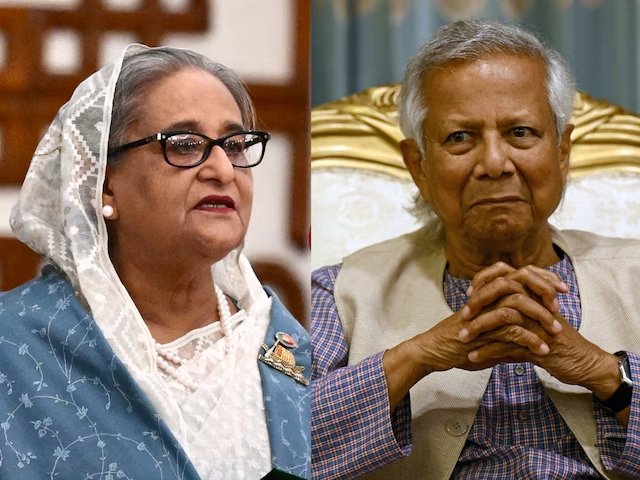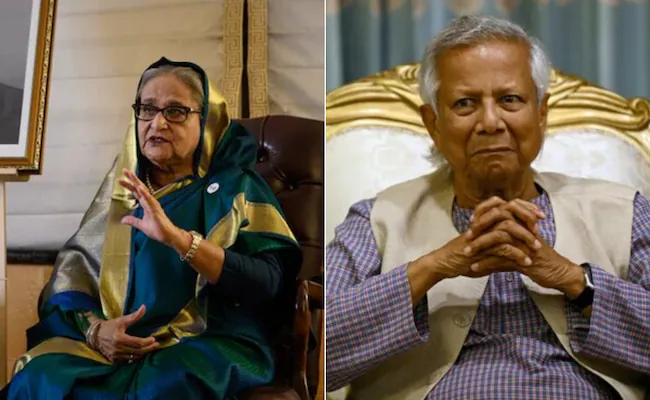In a surprising and politically charged statement, Muhammad Yunus, head of Bangladesh’s interim government, issued a stern message to former Prime Minister Sheikh Hasina, advising her to maintain silence while in India. Yunus emphasized that Hasina’s public remarks from India have caused discomfort for both nations and suggested that it would be best if she refrained from making any political statements until further notice. Let’s delve deeper into this political drama and explore the ramifications of Yunus’ request for both Bangladesh and India.
The Context Behind the Message
Yunus, who now serves as the Chief Advisor of Bangladesh after Sheikh Hasina’s ousting, expressed concern about the former prime minister’s ongoing political commentary from Indian soil. According to Yunus, her outspoken behavior is seen as an “unfriendly gesture” towards Bangladesh, a country she once led. His message was clear: Bangladesh wants Hasina to remain silent to prevent diplomatic strain between the two neighboring nations.
Yunus also highlighted a deeper issue—Bangladesh’s perception of its ties with India. His remarks suggested that Hasina’s voice, when raised in India, has the potential to disrupt the strong relationship between Dhaka and New Delhi. As long as Hasina is on Indian soil, Yunus believes her silence would be the best course of action for the benefit of both countries.
The Importance of Maintaining Silence
Why does silence matter? In politics, silence can sometimes be more powerful than words. For Hasina, maintaining silence during her stay in India could potentially ease tensions in Bangladesh. According to Yunus, the interim government might have been willing to let things slide had she not made public statements, implying that her silence could have led to the whole situation being forgotten over time.
Her speeches from India, Yunus claimed, stirred the pot unnecessarily. He asserted that “no one likes it,” further alluding to the discomfort Hasina’s words are causing among both the political circles in Bangladesh and the diplomatic community.
The Diplomatic Angle Between Bangladesh and India
The Bangladesh-India relationship has always been a delicate balancing act. With both countries sharing a deep historical bond, Yunus pointed out that India’s response to Hasina’s current situation plays a crucial role in maintaining regional stability.
From Yunus’ perspective, India needs to move beyond certain narratives regarding Bangladesh’s internal politics, particularly the portrayal of Sheikh Hasina as the only leader who can maintain peace and stability. Yunus firmly dismissed this notion, stressing that Bangladesh wouldn’t descend into chaos without her leadership—a common claim made by Hasina’s supporters.
Awami League and Bangladesh’s Political Landscape
Sheikh Hasina has been a dominant political figure in Bangladesh, particularly as the leader of the Awami League. Her removal from power followed a wave of anti-government protests, with the unrest reaching its peak on August 5. Yunus, as the interim leader, is tasked with steering the country through this transitional period, and it seems he believes that her absence from the political scene could create an opportunity for Bangladesh to move forward.
Hasina’s public remarks, however, seem to pose a roadblock to this goal, as she continues to exert influence from afar. By calling for justice and speaking on political matters from Indian soil, Yunus feels that she’s only delaying the inevitable process of resolving Bangladesh’s current political crisis.
Sheikh Hasina’s Stance
From Hasina’s point of view, her comments from India are justified. On August 13, she made a bold statement demanding justice for the terror acts and killings that took place recently in Bangladesh. She called for investigations and punishment for those involved in the violence, a stance that directly challenges the interim government.
In a way, Hasina is refusing to go quietly into the night. By speaking out, she is asserting her continued relevance and influence in Bangladeshi politics, even from abroad.
The Anti-Government Protests and Their Impact
Hasina’s ouster followed unprecedented anti-government protests. The protests, driven by dissatisfaction with her leadership, reached a boiling point on August 5. The unrest led to her resignation and subsequent flight to India. Since then, her presence in the country has fueled intense speculation in Bangladesh.
These protests weren’t just a political shakeup—they were a reflection of the growing discontent in Bangladesh. Hasina’s government had been criticized for its handling of various internal issues, leading to a significant drop in her popularity. The protests symbolized a breaking point for many in the country, culminating in her resignation and eventual exile.
Muhammad Yunus’ Role in the Interim Government
Muhammad Yunus, a renowned figure in Bangladesh and globally for his work in microfinance, now finds himself at the helm of the interim government. His leadership during this transitional phase is critical, as Bangladesh seeks to stabilize its political climate.
Yunus’ appointment as Chief Advisor came as a direct result of Hasina’s departure, and his main focus now is to lead the country toward peace and stability. He has made it clear that Bangladesh values strong relations with India but insists that Hasina’s silence is necessary to maintain these ties.
Has Bangladesh Communicated With India?
When asked whether Bangladesh has directly communicated its concerns to India, Yunus confirmed that the message had been conveyed verbally and quite firmly. The Bangladeshi government has made it clear that Hasina should avoid making any political remarks while on Indian soil.
The nature of diplomacy between the two nations means that sometimes communication happens through informal channels. It’s apparent that Bangladesh has chosen a diplomatic approach, but Yunus’ public statements also seem to send a strong signal that the matter is far from settled.
The Speculation Surrounding Sheikh Hasina’s Future
With Hasina staying in India for nearly a month, speculation about her future continues to swirl. Will she be extradited? Will she make a political comeback? These are the questions on the minds of many in Bangladesh.
Yunus’ comments seem to suggest that Bangladesh would prefer to see her back on home soil but under conditions that favor the current administration. While extradition has not officially been request, the possibility remains open, and it is likely that her future will shape by both internal and external political factors.
What’s Next for Bangladesh?
As Bangladesh navigates this political uncertainty, the country’s focus remains on finding stability. Yunus is attempting to move beyond the narrative that places Sheikh Hasina at the center of everything, suggesting that Bangladesh’s future doesn’t rest on her leadership alone.
The interim government is working to create a new path forward, one that allows the country to thrive independently of its past leadership. However, whether or not this transition will be smooth depends on how events unfold in the coming months.
Conclusion
In summary, Muhammad Yunus’ message to Sheikh Hasina is clear—silence is golden. By maintaining silence during her stay in India, Hasina could potentially ease tensions between the two nations and allow Bangladesh to move forward in its political transition. As speculation about her future continues, it remains to seen how this complex political situation will evolve. For now, the spotlight is on Bangladesh, and the world is watching closely.










